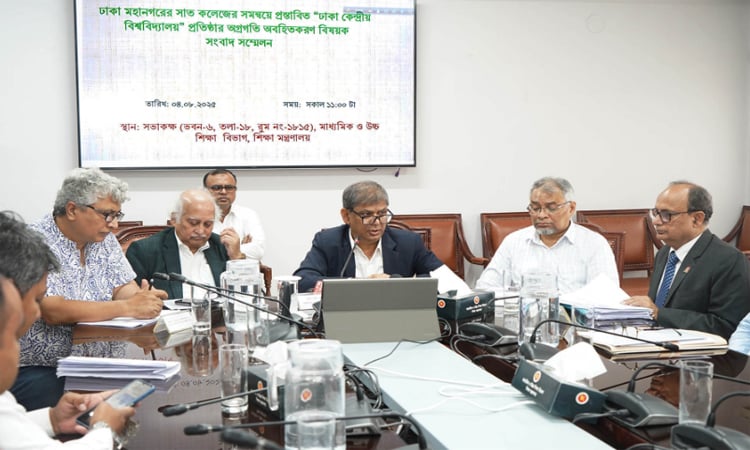News Flash

DHAKA, August 4, 2025 (BSS) - The proposed Dhaka Central University (DCU) will conduct its academic and research activities by dividing the seven colleges in the capital into four schools, said Additional Secretary Mojibur Rahman, who is in routine charge of Secretary of the Ministry of Education.
These are: School of Science, School of Arts and Humanities, School of Business Studies, and School of Law and Justice.
Establishment of DCU, comprising the seven colleges, will be implemented in four phases, he said today at a press conference at the ministry's conference room in the Secretariat.
The Secretary said that the schools will be identified based on the respective colleges. Considering the existing realities and limitations, a new structural model has been proposed for the university, he said, adding that its institutional framework includes 40 percent of classes conducted online while 60 percent offline. Students will be allowed to change disciplines in the third year.
University Grants Commission (UGC) Chairman Prof Dr SMA Faiz said that students' demands have been accepted and everything will be done to ensure the best outcome for them. "We aim for a constructive solution and need everyone's cooperation," he said.
Mentioning that emphasis is being given to all colleges equally, he said, "Not just Dhaka College, every college is being given equal priority. We expect the best outcomes by including everyone."
The press conference, attended by officials from the Ministry of Education and other stakeholders, revealed that A hybrid teaching model will be adopted, with provisions for laptops and affordable internet access. Existing students will complete their studies under the previous academic structure.
It was announced that the university will follow an interdisciplinary and hybrid education model, combining online and offline classes. However, all examinations will be held in person. Students will study non-major courses during the first four semesters, while major courses in the next four semesters based on their chosen discipline.
In the fifth semester (third year), students may change their discipline subject to certain conditions, but campus transfers will not be allowed.
All university activities will be governed by the Academic Council, Senate, and Syndicate. A Proctor will be appointed, along with one male and one female Deputy Proctor in each college, totaling 14 Deputy Proctors across the seven colleges.
In response to a question about how this university differs from Dhaka University or others, a UGC member explained that all students will study non-major courses in the first two years, after which disciplines will be assigned based on specific marks.
For example, a student may qualify for Accounting or Management depending on his or her scores. While such a model may not be widely available globally, it has been developed after reviewing various international models.
The press conference also disclosed that the university will be established in phases. Following the approval of the draft law and issuance of the ordinance, a tripartite agreement will be signed between the Ministry of Education, the UGC, and the university. Subsequently, administrative and academic activities will begin, including the appointment of a Vice-Chancellor.
It was further said that the main campus of the proposed central university will be located in a convenient area for all. The new structure has been designed considering current realities and limitations, with schools identified based on the respective colleges.
HSC-level education will continue in five of the seven colleges. Undergraduate and HSC students will share campus resources through a time, space, and resource sharing model. Students at various levels will complete their education under the existing academic framework.
Measures will be taken to conduct timely exams, publish results quickly, and reduce session congestion.
Additionally, it was announced that teachers, officers, and staff will be centrally recruited and distributed among colleges as needed. Budgeting and management will be handled centrally by the university. Each college will have a modern library, cafeteria, medical center, and transportation system.
Admissions will be conducted centrally. The number of students in each discipline will be determined rationally by the authorities.
Every student will receive a laptop and necessary accessories in the first year, along with affordable internet services.
Administrative tasks such as admission, registration, and applications will be completed through an IT-based digital system. Students will be able to make inquiries through the IT platform.